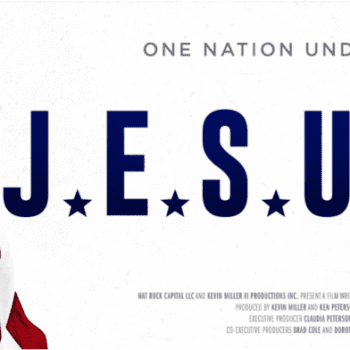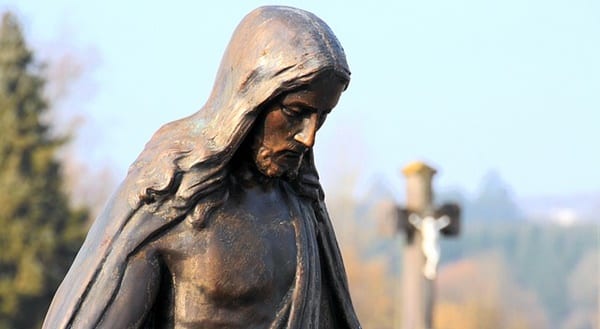
President Obama just laid to rest all the speculation that he isn’t a Christian.
During his speech in Kenya, he said one of the most Christian things any U.S. president has ever said. No, he didn’t shove Jesus down anyone’s throat. He did something much more important. He definitively pointed to what makes the United States a “Judeo-Christian Nation.”
“What makes America exceptional is not the fact that we are perfect. It’s the fact that we struggle to improve. We’re self-critical. We work to live up to our highest values and ideals, knowing that we’re not always going to achieve them perfectly, but we keep on trying to perfect our union. And what’s true for America is also true for Kenya. You can’t be complacent and accept the world just for what it is. You have to imagine what the world might be. And then push and work toward that future. Progress requires that you honestly confront the dark corners of our own past. Extend rights and opportunities to more of your citizens. See the differences and diversity of this country as a strength, just as we in America try to see the diversity of our country as a strength, not a weakness.”
What’s so Christian about that statement? Many will disagree with the President. They will say that his emphasis on self-criticism is actually anti-American. But the freedom to be self-critical is an important freedom that the United States models to other nations. Just as important, that self-criticism is based on America’s Judeo-Christian roots.
I tend to bristle whenever politicians talks about American “exceptionalism,” but self-criticism is actually exceptional in human history. Throughout history, very few nations ever attempted to be self-critical, certainly not in a way that confronts “the dark corners of our past” or is concerned about extending “rights and opportunities” to those who are marginalized by society.
René Girard calls this the “modern concern for victims” in his book I See Satan Fall Like Lightning. He writes,
“Examine ancient sources, inquire everywhere, dig up the corners of the planet, and you will not find anything anywhere that even remotely resembles our modern concern for victims. The China of the Mandarins, the Japan of the Samaria, the Hindus, the pre-Columbian societies, Athens, republican or imperial Rome—none of these were worried in the least little bit about victims, whom they sacrificed without number to their gods, to the honor of the homeland, to the ambition of conquerors, small or great.”
For example, take ancient Rome, one of the greatest empires in human history. Rome promised peace to its citizens, but the Pax Romana was waged with a sword. Because Rome benefited from that violence, there was no Roman self-criticism of its political system. When Rome conquered another nation, there was no self-critical discussion about “human rights.” Nor did Rome have anything like the modern impetus for “social justice” that sought to change unjust political and economic structures. As theologian James Alison writes, in ancient Rome, “the defeated would be killed or enslaved without further ado. They had no rights: that’s what being defeated meant.”
The exception in the ancient world were the Jews. Unlike other nations, the Jews were self-critical and that self-criticism stemmed from their experience of oppression in Egypt. The Egyptian Empire enslaved the ancient Israelites. Like in ancient Rome, there was no self-critical voice in ancient Egypt. No Egyptian prophet would ever say to Pharaoh, “You know, maybe we should treat those Israelites with a little more compassion and respect.”
But Moses set the course for the transformation of the human understanding of God. The Judeo-Christian tradition primarily begins with the Exodus. The God of the Exodus is the God who identifies not with the powerful, but with the victims of human culture.
Exodus reveals that God breaks into our world as One who is with the scapegoats of human society. The prophetic word from this God doesn’t justify political action that leads to oppression, injustice, and poverty like the ancient gods of Rome or Egypt. Rather, this God, the God of the Hebrews, sides with the oppressed.
For ancient Israel, the political message was clear: God sides with the oppressed, so don’t become an oppressor. Whenever Israel’s political establishment neglected to care for the poor, the widows, the marginalized, there was a self-critical message that demanded the nation care for the poor and marginalized:
There will always be poor people in the land. Therefore, I command you to be openhanded toward your brothers and toward the poor and needy in your land. (Deuteronomy 15:9)
Cursed is the man who withholds justice from the alien, the fatherless or the widow. (Deuteronomy 27:19)
He raises the poor from the dust and lifts the needy from the ash heap; he seats them with princes and has them inherit a throne of honor. (I Samuel 2:8)
Because of the oppression of the weak and the groaning of the needy, I will now arise, says the Lord, I will protect them from those who malign them. (Psalm 12:5)
A ruler who oppresses the poor is like a driving rain that leaves no crops. (Proverbs 28:3)
The reason the Bible was so insistent that the good people of Israel care for the weak, poor, and scapegoated victims of Israel is because good people often fail to question their own goodness. Because good people can be so pleased with their goodness, they simply cannot believe that they have become oppressors and so they cannot be self-critical about their oppressive ways. The prophet Ezekiel spoke directly to and about people who refused to doubt their own goodness when he said, “The people of the land practice extortion and commit robbery; they oppress the poor and needy and mistreat the alien, denying them justice.”
Jesus continued to highlight the particularly Jewish concern for victims of culture. For Jesus, to participate in the Kingdom of God was to structure our lives in a way that cares for those in need. He stated his mission in his first sermon, “The Spirit of the Lord is upon me, because He has anointed me to preach good news to the poor. He has sent me to proclaim freedom for the prisoners and recovery of sight to the blind, to release the oppressed.”
Jesus took this a step further near the end of his life. He explicitly identified himself with the poor and needy, the very ones that good people ignored without remorse:
“‘Come, O blessed of my Father, inherit the kingdom prepared for you since the foundation of the world: for I was hungry and you gave me to eat, I was thirsty and you to drink, I was a stranger and you welcomed me, naked and you clothed me, sick and you visited me, in prison and you came to see me.’” Then the righteous will answer him, ‘Lord, when did we see you hungry and feed you, thirsty and give you to drink, a stranger and welcome you, naked and clothe you, sick or in prison and visit you?’ And the King will answer them, ‘Truly, I say to you, as you did it to one of the last of these my brothers, you did it to me.’”
President Obama has never been more Christian than when he emphasized America’s exceptional ability to be self-critical. Amidst human history, that ability to doubt our own goodness for the sake of victims we have created is exceptional. If the U.S. has any claim to Judeo-Christian roots, it’s because of that ethical concern.
Stay in the loop! Like Teaching Nonviolent Atonement on Facebook!















